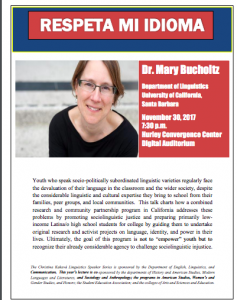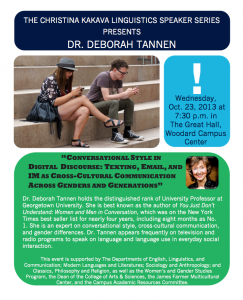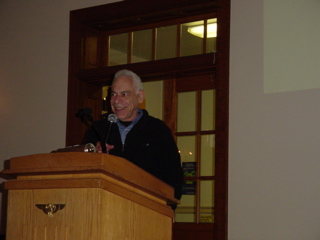Linguistics Speaker Series
“Respeta mi idioma”: Promoting Sociolinguistic Justice through Youth Research and Activism
Dr. Mary Bucholtz (Department of Linguistics, University of California, Santa Barbara)
November 30, 2017 at 7:30 p.m.
HCC Digital Auditorium
Linguists have a longstanding commitment to linguistic diversity and equality. For scholars who work in educational settings, this research has a special urgency, given the increasing educational needs of young people from diverse linguistic backgrounds and the declining resources available to support their academic success. Moreover, youth who speak sociopolitically subordinated linguistic varieties regularly face the devaluation of their language in the classroom and the wider society, despite the considerable linguistic and cultural expertise they bring to school from their families, peer groups, and local communities. In this talk I demonstrate how a combined research and community partnership program in California addresses these problems by promoting sociolinguistic justice (Bucholtz et al. 2014). SKILLS (School Kids Investigating Language in Life and Society) prepares primarily low-income Latina/o high school students for college by guiding them to undertake original research and activist projects on language, identity, and power in their lives. The goal of SKILLS is not to “empower” youth but to recognize their already considerable agency to challenge sociolinguistic injustice. I consider various student-activist projects within the program that illustrate youth agency in countering linguistic racism. The SKILLS program provides one example of how scholars can help local youth to make use of their own linguistic and cultural knowledge and insights to work toward sociolinguistic justice.
The Christina Kakavá Linguistics Speaker Series is sponsored by the Department of English, Linguistics, and Communication. This year’s lecture is co-sponsored by the departments of History and American Studies, Modern Languages and Literatures, and Sociology and Anthropology; the programs in American Studies, Women’s and Gender Studies, and Honors; the Student Education Association; and the colleges of Arts and Sciences and Education.
Past Speakers in this Series:
“Masculine, Feminine, Neuter, Vegetable: Grammatical Gender around the World”
Dr. Ruth Kramer (Department of Linguistics, Georgetown University)
November 7, 2016 at 7:30 p.m.
HCC Digital Auditorium
Grammatical gender inspires awe in language scientists and frustration in language learners. Why is the word ‘chair’ feminine in French, masculine in German, and neuter in Tamil? Why do some languages have 2 genders but others have 20? This talk is a guided tour of grammatical gender, where we will try to answer tough questions like these and uncover the deep similarities across the dazzling variety of gender systems in the world’s languages.
“Solving Crimes with Linguistics”
Dr. Carole E. Chaski (Institute for Linguistic Evidence)
April 7, 2015 at 7:30 p.m.
Pioneering the field of forensic computational linguistics, Chaski develops linguistics for author identification and classification of threat letters, suicide notes, and predatory chats. Chaski’s computerized methods are used in the U.S., Korea, China, Pakistan and Australia. Chaski has presented at the Linguistic Society of America, American Academy of Forensic Science, IEEE Homeland Security, and TALE: The Association for Linguistic Evidence and international conferences since 1995. She has worked in criminal investigations of homicide, suicide, kidnapping, rape, child abuse, intellectual property theft, and terroristic threatening.
This event was co-sponsored by the Departments of English, Linguistics, and Communication; Classics, Philosophy, and Religion; Computer Science; Mathematics; Modern Languages and Literatures; Psychology; Sociology and Anthropology; Women’s and Gender Studies; the Center for Teaching Excellence and Innovation; and the Office of the Dean of the College of Arts and Sciences.
“Conversational Styles in Digital Discourse: Texting, Email, and IM as Cross-cultural Communication Across Genders and Generations”
Dr. Deborah Tannen, Georgetown University
Oct. 23, 2013 at 7:30 p.m.
Dr. Deborah Tannen holds the distinguished rank of University Professor at Georgetown University. She is best known as the author of You Just Don’t Understand: Women and Men in Conversation, which was on the New York Times best seller list for nearly four years, including eight months as No. 1. She is an expert on conversational style, cross-cultural communication, and gender differences. Dr. Tannen appears frequently on television and radio programs to speak on language and language use in everyday social interaction.
This event was supported by the Departments of English, Linguistics, and Communication; Modern Languages and Literatures; Sociology and Anthropology; and Classics, Philosophy and Religion, as well as the Women’s and Gender Studies Program, the Dean of the College of Arts & Sciences, the James Farmer Multicultural Center, and the Campus Academic Resources Committee.
“The Public Life Of Language Differences”
Dr. Walt Wolfram, North Carolina State University
November 18, 2008

Pioneering sociolinguist Walt Wolfram, the William C. Friday Distinguished Professor of English at North Carolina State University at Raleigh, directs the North Carolina Language and Life Project. The project researches and documents the rich variety of language and culture in that state, one of the most linguistically diverse in the U.S. A reception will follow.
Dr. Wolfram has produced numerous documentary films and served as linguistic adviser for Sesame Street. He has authored or co-authored more than 250 articles and 20 books including Dialects in Schools and Communities, American English: Dialects and Variation; American Voices: How Dialects Differ from Coast to Coast; The Development of African American English; Fine in the World: Lumbee Language in Time and Place; and Hoi Toide on the Outer Banks: The Story of the Ocracoke Brogue.
This event was sponsored by the Department of English, Linguistics, and Communication, with the support of the Departments of Education, Geography, Historical Preservation, Modern Foreign Languages, Psychology, and Sociology/Anthropology, and the Campus Academic Resources Committee.
“Linguistic Profiling in the African Diaspora: Voice Discrimination in the U.S. and South Africa”
Dr. John Baugh, Washington University in St. Louis
November 13, 2007 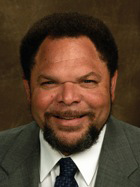
The Linguistics Speaker Series hosted Dr. John Baugh, a well-known African-American linguist and education expert, who holds the Margaret Bush Wilson professorship in Arts & Sciences at the Washington University in Saint Louis. Dr. Baugh is also the director of African and African American Studies and professor of Anthropology, Education, English, Linguistics, and Psychology.
Dr. Baugh’s recent work has been on the identification of the race of speakers from characteristics of their voices during telephone conversations, a process he termed “linguistic profiling.” The implications of his research for housing discrimination led to his receiving a Pioneer of Fair Housing award in 2004 from the U.S. Department of Housing and Urban Development.
Prof. Baugh is the author of Black Street Speech: Its History, Structure and Survival; Out of the Mouths of Slaves: African American Language and Educational Malpractice; Beyond Ebonics: Linguistic Pride and Racial Prejudice; and the co-author of Talkin Black Talk: Language, Education, and Social Change.
This event was sponsored by the Department of English, Linguistics, and Speech, with the support of the Departments of Education, Geography, Sociology/Anthropology, and Psychology.
“My Life (such as it is, so far) in Lexicography”
Dr. Frank Abate, Dictionary Editor, Journalist, Author
April 12, 2007
Frank Abate is an independent lexicographer, editor, writer, and photographer based in the Cincinnati area. He has edited more than 50 dictionaries and other reference works, and has been published and interviewed in newspapers, journals, and other media. His editorial work includes the New Oxford American Dictionary (principal editor), the Oxford American Dictionary and Language Guide (editor in chief), the Omni Gazetteer of the United States of America (compiler), and Connecticut Trivia (author).
“What are Dictionaries and WHY are they Important?”
Dr. William J. Frawley, President of the University of Mary Washington and Distinguished Professor of Linguistics
November 13, 20
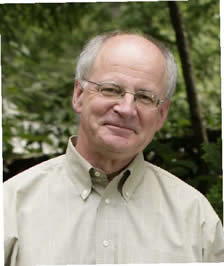
“FOXP2: A Genetic Key to Language”
Dr. Philip Lieberman, Fred M. Seed Professor of Cognitive and Linguistic Sciences and Professor of Anthropology at Brown University
November 14, 2005
“The Growth of Forensic Linguistics in the 21st Century”
Dr. Roger Shuy, Distinguished Research Professor of Linguistics, Emeritus, Georgetown University
October, 18 2004
“The Growth of Forensic Linguistics in the 21st Century”
Dr. Marc Okrand, Director for Live Captioning at the National Captioning Institute and creator of Klingon
“Language and Science Fiction: The Case of Klingon”
November 18, 2003
“Women’s and Men’s Conversations as Cross-Cultural Communication”
Dr. Deborah Tannen, University Professor, Georgetown University
November 2002
